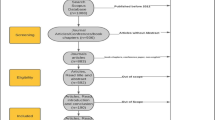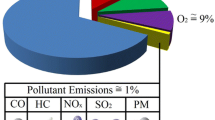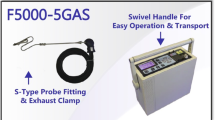Abstract
In this study, we investigated the RDE (real driving emissions) test with a diesel passenger vehicle and two RDE driving routes. We then experimentally analyzed the implications for fuel consumption of a 2.2L diesel-fueled vehicle. First, we found that the weighting factor, which is the product of the carbon dioxide average value from the MAW (moving average window) analysis, results in real-road fuel consumption measurement that are closer to the WLTC (worldwide harmonized light vehicles test cycles) measurement results. Therefore, we ignored the weighting factor of the WLTC and used a new weighting factor of distance instead. In order to determine the influence of each factor on the fuel efficiency, we analyzed the carbon-dioxide emission for the operation of additional equipment. And OBD values were used to develop correction equations to compensate for vehicle driving regions where GPS data was not measured in the test route. When using the weighting factor based on the WLTC standard, the weighting factor based on distance was introduced to calculate the fuel consumption in this study.
Similar content being viewed by others
References
L. Taewoo, Study on methodology of emission factors development for vehicles based on on-road measurements, Doctor of Philosophy in Mechanical Engineering, Inha University, Incheon, Korea (2010).
P. Junhong, A study on real driving emissions for light-duty vehicles based on data representativeness and repeatability, Doctor of Philosophy in Mechanical Engineering, Inha University, Incheon, Korea (2012).
T. Donateo and M. Giovinazzi, Some repeatability and reproducibility issues in real driving emission tests, SAE Technical Paper 2018-01-5020 (2018).
Z. Samaras et al., A model based definition of a reference CO2 emissions value for passenger cars under real world conditions, SAE Technical Paper 2018-37-0031 (2018).
R. Williams et al., Impact of demanding low temperature urban operation on the real driving emissions performance of three european diesel passenger cars, SAE Technical Paper 2018-01-1819 (2018).
N. Milovanovic and S. Hamalian, The fuel consumption and NOx emission optimisation for future diesel passenger cars, SAE Technical Paper 2016-01-0916 (2016).
A. Auld, A. Ward, K. Mustafa and B. Hansen, Assessment of light duty diesel after-treatment technology targeting beyond euro 6d emissions levels, SAE Int. J. Engines, 10(4) (2017) 1795–1807.
L. Taewoo, Study on methodology of emission factors development for vehicles based on on-road measurements, Doctor of Philosophy in Mechanical Engineering, Inha University, Incheon, Korea (2010).
Acknowledgments
This research was supported by the R&D project on Industrial Core Technology (2018) of MOTIE (Ministry of Trade, Industry and Energy) in the Republic of Korea.
Author information
Authors and Affiliations
Corresponding author
Additional information
Recommended by Editor Yong Tae Kang
Jinwook Lee received his Ph.D. in Mechanical Engineering, Seoul National University, Korea. He is currently a Professor at School of Mechanical Engineering, Soongsil University. His research interests are automotive powertrain system and clean energy technology for ICEV, HEV and FCEV.
Tahkkyoo Kim received his Master in Mechanical Engineering, Soongsil University, Korea. He now serves as an Assistant Researcher in the Automotive Powertrain Laboratory at Soongsil University. His research interests are after-treat system, low emission powertrain system, and vehicle system simulation.
Insu Cho received his Ph.D. in Mechanical Engineering, Soongsil University, Korea. He now serves as an Assistant Researcher in the Automotive Powertrain Laboratory at Soongsil University. His research interests are fuel injection system, low emission powertrain system, and vehicle system simulation.
Taehyun Kim is an undergraduate in Mechanical Engineering, Soongsil University, Korea. He now serves as Assistant Researcher in the Automotive Powertrain Laboratory at Soongsil University. His research interests are in-wheel motor system, low emission powertrain system and fuel injection system.
Wootaek Kim is an undergraduate in Mechanical Engineering, Soongsil University, Korea. He now serves as a bachelor-master degree student in the Automotive Powertrain Laboratory at Soongsil University. His research interests are fuel injection system, low emission powertrain system, and vehicle system simulation.
Rights and permissions
About this article
Cite this article
Kim, T., Cho, I., Kim, TH. et al. Experimental evaluation of on-road fuel consumption for a 2.2 L diesel-fueled vehicle at two driving routes. J Mech Sci Technol 34, 3403–3413 (2020). https://doi.org/10.1007/s12206-020-0733-z
Received:
Revised:
Accepted:
Published:
Issue Date:
DOI: https://doi.org/10.1007/s12206-020-0733-z




